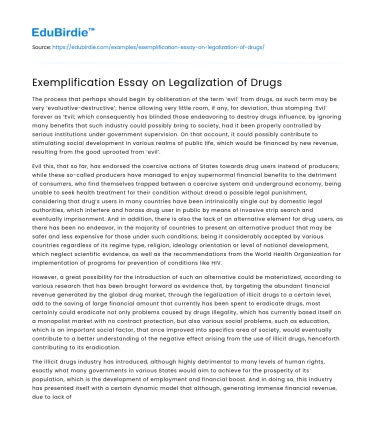The process that perhaps should begin by obliteration of the term ‘evil’ from drugs, as such term may be very ‘evaluative-destructive’; hence allowing very little room, if any, for deviation, thus stamping ‘Evil’ forever as ‘Evil; which consequently has blinded those endeavoring to destroy drugs influence, by ignoring many benefits that such industry could possibly bring to society, had it been properly controlled by serious institutions under government supervision. On that account, it could possibly contribute to stimulating social development in various realms of public life, which would be financed by new revenue, resulting from the good uprooted from ‘evil’.
Evil this, that so far, has endorsed the coercive actions of States towards drug users instead of producers; while these so-called producers have managed to enjoy supernormal financial benefits to the detriment of consumers, who find themselves trapped between a coercive system and underground economy, being unable to seek health treatment for their condition without dread a possible legal punishment, considering that drug’s users in many countries have been intrinsically single out by domestic legal authorities, which interfere and harass drug user in public by means of invasive strip search and eventually imprisonment. And in addition, there is also the lack of an alternative element for drug users, as there has been no endeavor, in the majority of countries to present an alternative product that may be safer and less expensive for those under such conditions; being it considerably accepted by various countries regardless of its regime type, religion, ideology orientation or level of national development, which neglect scientific evidence, as well as the recommendations from the World Health Organization for implementation of programs for prevention of conditions like HIV.
Save your time!
We can take care of your essay
- Proper editing and formatting
- Free revision, title page, and bibliography
- Flexible prices and money-back guarantee
However, a great possibility for the introduction of such an alternative could be materialized, according to various research that has been brought forward as evidence that, by targeting the abundant financial revenue generated by the global drug market, through the legalization of illicit drugs to a certain level, add to the saving of large financial amount that currently has been spent to eradicate drugs, most certainly could eradicate not only problems caused by drugs illegality, which has currently based itself on a monopolist market with no contract protection, but also various social problems, such as education, which is an important social factor, that once improved into specifics area of society, would eventually contribute to a better understanding of the negative effect arising from the use of illicit drugs, henceforth contributing to its eradication.
The illicit drugs industry has introduced, although highly detrimental to many levels of human rights, exactly what many governments in various States would aim to achieve for the prosperity of its population, which is the development of employment and financial boost. And in doing so, this industry has presented itself with a certain dynamic model that although, generating immense financial revenue, due to lack of controlling legislation, has not shown compelling reasons that justify the overwhelming harm caused to human rights and consequently to its principle of practice, and the huge financial resources wasted, in efforts made by trying to eradicate it. Therefore, the social appeal, many times implied in legal research, in favor of the legalization of drugs to a certain level, supports that legalization is by far the only feasible route that could proportionate certain control over drugs, by means of obtaining partial control of its financial revenue through creation of future legal legislation.
Action this has been attempted in the past (1890), through domestic legislation, by initial efforts from the United Nations in applying taxes on imported goods, like Opium, morphine, and all salts thereof; leading to its stronger commitment, confirmed in the 1925 Convention and consequently the 1931 convention, achieving agreements related to the control on manufacturing, sale and movement of drugs; confirming that all variations in quantities generated by different countries linked to the convention, would regularly be reported to the Permanent central Opium board statistic. However, the aforementioned effort in controlling illicit drugs would eventually encounter its difficulties in progressing, due to the ‘Financial Revenue’ element, as the system of control suggested by the conventions, impliedly assured certain advantages to the more important manufacturers, as the production of many narcotics elements have been of great contribution to many countries GDP.






 Stuck on your essay?
Stuck on your essay?

